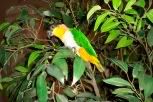Caiques are bird of the month on www.birdchannel.com (hosted by the BirdTalk magazine folks). They are requesting people send in their stories of living with caiques, and why these birds are special to you. This is a great chance to educate others about these wonderful birds, so please, if you have a caique, consider sending a story in!
My submission:
I am owned by two rehomed caiques, Higgins and Rosie (aka Goober).
They are the loves of my life- after living with caiques for three
years I can't imagine having a house without these wonderful birds.
I'm often asked by non bird folk what caiques are like, and why I am
so attracted to them. In an effort to help people understand what a
caique is really like, I give this description: "Imagine a dog, like a
border collie, the type of dog that needs to be worked. Now, mix in
the intelligence of an african grey parrot, and the attention span of
a moth. You have a caique".
There is never a dull moment with a caique around. They may be hanging
from the curtains, flying from playgym to playgym with a great big
'whirrring' sound to wrestle with one another, or beating up toys in
their cages. They are fantastic eaters and eat with gusto. I often
refer to them as little garbage disposals- I've yet to find a food
they dislike!
Another thing that endears me to these wonderful little birds is how
outgoing they are. I've had neighborhood children come and play with
my birds, much to the birds delight. Just about anyone can handle
them, so long as they are unafraid. Most people are taken quickly by
their quirky little personalities.
Higgins and Rosie bring laughter into my life daily. I enjoy looking
into the future with them and growing old together.
Emily of Caique Crazy Forums
Bird of the Month
caiquecrazy Thursday, December 27, 2007 0 comments
Caiques are unique
Caiques are an interesting species. They differ in many ways from other parrot species, both in large ways and small. As we learn more about caiques, and parrots in general, we gain greater knowledge on how to care for these birds in a more natural and healthful way.
Like other parrot species, caiques can hybridize. They can hybridize amoung themselves- there have been noted yellowthigh/black head hybrids, as well as green thigh/ yellow thigh. Interestingly, unlike some other parrot species, it has been noted that caiques can hybridize with other species of birds. On his website, John McMichael has a small blurb about a caique hybridizing with an illigers macaw. Unfortunately no pictures are available, and no information is provided as to if the eggs were fertile or not. This piece of information has the potential for a lot- if the eggs were fertile, it would mean that genetically caiques are 'close' to the family of small macaws. We could learn a lot by analyzing and probing for more information.
Did you know caique parrots are right footed? Studies have shown that a parrot can show 'footedness', that is, a preference of using one foot over the other when eating, etc. Much like our preference for writing with one hand or the other. In comparison to other parrot species generally exhibiting left foot preference, caiques prefer the right foot. I wonder what this means as to their way of thinking? In humans, using one hand over the other shows a 'brain side preference- left or right'.
Unlike other parrots, the caiques upper beak, the maxilla, is not fixed, but rather hinged. This is believed to be an adaption to climbing.
It is also said that caique chicks are deaf when they are hatched, unlike other parrot species. They are also born with no ear opening. The opening appears at around two to three weeks of age, when the eyes begin to open.
Interestingly, information and prints on caiques date back to 1783. Yet in 2007, this bird is considered to be somewhat rare in the avian community, not being as readily available as other parrot species in the pet trade.
One must wonder about the lack of information available on these parrots, and when they will gain enough attention from influential people within the avian community to warrant observation and study.
caiquecrazy Tuesday, December 4, 2007 1 comments





